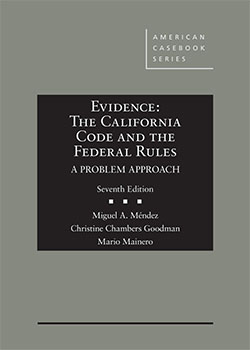- Home
- Evidence: The California Code and the Federal Rules, A Problem Approach
Evidence: The California Code and the Federal Rules, A Problem Approach
The Seventh Edition of this casebook provides a systematic comparison of the Evidence Code’s and Federal Rules’ approaches to admissibility of evidence. Transcripts of witness examinations help students visualize the process of presenting and objecting to evidence. The book combines the problem and witness examination approach with text, not cases, that sets out the law of evidence in a clear and concise manner. It discusses major cases and the policies and concepts underlying the rules, not just the rules themselves. The end of each chapter includes the text of the code sections and rules discussed in that chapter. A revised teacher's manual, incorporating detailed explanations for the updated hypotheticals, will be available to adopting professors.
Changes from the Sixth Edition include: (1) Significant revisions of the Questions and Problems to eliminate true-false questions and replace them with real-life hypotheticals that give students an opportunity to argue for and against the admission of specific items of evidence; (2) Reductions in the text regarding the role of 1982’s Proposition 8 to reflect the reality that it has made only a few changes in the admissibility of evidence in criminal cases; (3) Revisions of the sections involving Specific Conduct for Non-Character Purposes, to better illustrate the difficulties in using uncharged offenses that are similar to the charged offenses; (4) Division of the Chapter on Impeachment of the Credibility of Witnesses to make it more manageable to teach and less daunting to explore; (5) Inclusion of recent developments limiting the use of hearsay by expert witnesses; and (6) Restructuring of the chapters on privileges by eliminating redundant material and grouping similar privileges together in one chapter, thus reducing the number of chapters on privileges from 11 to 6.
Imprint: West Academic Publishing
Series: American Casebook Series
Publication Date: 04/22/2019
Miguel A. Mendez, Stanford Law School
Christine Chambers Goodman, Pepperdine University School of Law
Mario Mainero, Chapman University School of Law
CasebookPlus™
This title is available in our CasebookPlus format. CasebookPlus provides support beyond your classroom lectures and materials by offering additional digital resources to you and your students. Anchored by faculty-authored formative self-assessments keyed to our most popular casebooks, CasebookPlus allows students to test their understanding of core concepts as they are learning them in class – on their own, outside of the classroom, with no extra work on your part. CasebookPlus combines three important elements:
- A new print or digital casebook
- Access to a downloadable eBook with the ability to highlight and add notes
- 12-month access to a digital Learning Library complete with:
- Chapter questions keyed to the casebook
- Black Letter Law questions (available in select subjects)
- Subject area review questions for end of semester use
Leading digital study aids, an outline starter, and audio lectures in select subjects
Students can still utilize CasebookPlus digital resources if they’ve purchased a used book or are renting their text by purchasing the Learning Library at westacademic.com.
With CasebookPlus, you can customize your students’ learning experience and monitor their performance. The quiz editor allows you to create your own custom quiz set, suppress specific quiz questions or quiz sets, and time-release quiz questions. Additionally, the flexible, customized reporting capability helps you evaluate your students’ understanding of the material and can also help your school demonstrate compliance with the new ABA Assessment and Learning Outcomes standards.
Changes from the Sixth Edition include: (1) Significant revisions of the Questions and Problems to eliminate true-false questions and replace them with real-life hypotheticals that give students an opportunity to argue for and against the admission of specific items of evidence; (2) Reductions in the text regarding the role of 1982’s Proposition 8 to reflect the reality that it has made only a few changes in the admissibility of evidence in criminal cases; (3) Revisions of the sections involving Specific Conduct for Non-Character Purposes, to better illustrate the difficulties in using uncharged offenses that are similar to the charged offenses; (4) Division of the Chapter on Impeachment of the Credibility of Witnesses to make it more manageable to teach and less daunting to explore; (5) Inclusion of recent developments limiting the use of hearsay by expert witnesses; and (6) Restructuring of the chapters on privileges by eliminating redundant material and grouping similar privileges together in one chapter, thus reducing the number of chapters on privileges from 11 to 6.
Learn more about this series.
Access Denied
Law School Faculty - Sign in or Create an Account to access this content. Law faculty who have created an account can sign in after receiving email notification that registration has been approved. Email accountmanager@westacademic.com or call 800-313-9378 for assistance.
Other Higher Education Faculty who wish to access digital review copies or teaching resources should contact their West Academic Account Manager at college@westacademic.com or 800-360-9378.
Adopters Only
This content is intended for adopters only. Sign in or Create an Account to access this content. Law faculty who have created an account can sign in after receiving email notification that registration has been approved. If you are an adopter who is unable to access this content after signing in, contact your account manager for assistance at accountmanager@westacademic.com or call 800-313-9378 for assistance.
Access Denied
Sign in or Create an Account to access this content. Faculty who have created an account can sign in after receiving email notification that registration has been approved. Contact us for assistance.
Law School Faculty: email accountmanager@westacademic.com or call 800-313-9378.
Other Higher Education Faculty: email college@westacademic.com or 800-360-9378.
Access Denied
Higher education faculty who wish to view this document should contact their West Academic Account Manager at college@westacademic.com or 800-360-9378.
